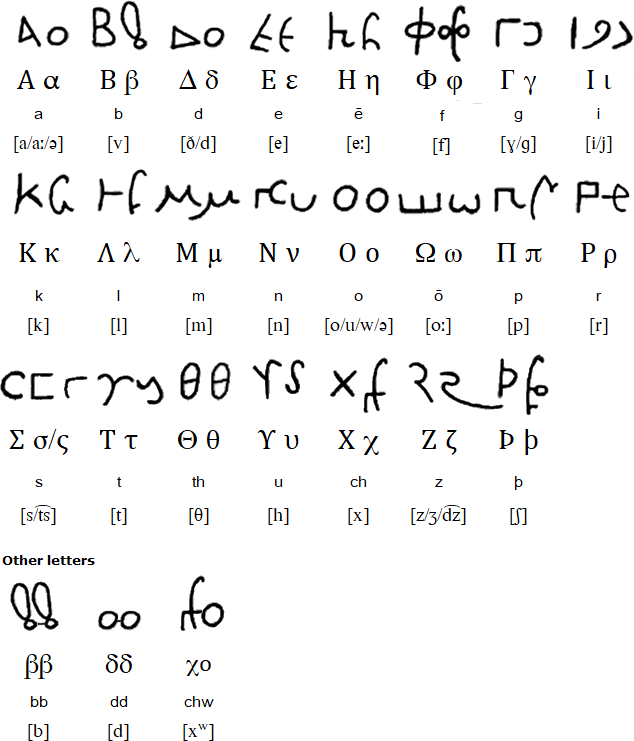Bactrian is an Eastern Iranian language that was spoken from about 300 BC to 1000 AD in Bactria, an ancient Iranian civilisation in Central Asia to the south of the Oxus River (Amu Darya) and north of the Hindu Kush mountains. This area is now part of northern Afghanistan. It was also used as an official language in the Kushan Empire, which covered an area including Tajikistan, Uzbekistan, Afghanistan, Pakistan, Eastern Iran and Northern India, and the Hephthalite Empire, which covered southern Uzbekistan and northern Afghanistan.
After Bactria was conquered by Alexander the Greet in 323 BC, Greek became the language of administration for two centuries. During the 2nd century BC, Bactria was invaded by various Scythian and Yuezhi tribes. One of those trubes, the Kushana, founded the Kushan Empire in the 1st century AD. They used the Greek language in administration at first, but switched to Bactrian in about 127 AD, although they continued to use the Greek alphabet.
Bactrian is the only Indo-Iranian language written with a version of the Greek script. It is known from inscriptions, coins, seals, manuscripts and other documents which have been found in Uzbekistan, Afghanistan and Pakistan. The phonology of the language is not known for certain.


Surkh Kotal inscription, 2nd century AD
Information about Bactrian
https://en.wikipedia.org/wiki/Bactrian_language
https://iranicaonline.org/articles/bactrian-language
https://www.britannica.com/topic/Bactrian-language
Avestan, Bactrian Baluchi, Bartangi, Dari, Gilaki, Hazaragi, Ishkashimi, Judeo-Persian, Juhuri, Khufi, Kumzari, Kurdish, Luri, Mazandarani, Munji, Ossetian, Ormuri, Oroshor, Persian, Parthian, Pashto, Rushani, Sanglechi, Sarikoli, Shabaki, Shughni, Tajik, Talysh, Tat, Wakhi, Wanetsi, Yaghnobi, Yazghulami, Yidgha, Zazaki
Arvanitic, Bactrian, Cypriot Arabic, Greek, Griko, Karamanli Turkish, Tsakonian
A-chik Tokbirim, Adinkra, ADLaM, Armenian, Avestan, Avoiuli, Bactrian, Bassa (Vah), Beitha Kukju, Beria (Zaghawa), Borama / Gadabuursi, Carian, Carpathian Basin Rovas, Chinuk pipa, Chisoi, Coorgi-Cox, Coptic, Cyrillic, Dalecarlian runes, Elbasan, Etruscan, Faliscan, Fox, Galik, Georgian (Asomtavruli), Georgian (Nuskhuri), Georgian (Mkhedruli), Glagolitic, Global Alphabet, Gothic, Greek, Hurûf-ı munfasıla, Irish (Uncial), Kaddare, Kayah Li, Khatt-i-Badí’, Khazarian Rovas, Koch, Korean, Latin, Lepontic, Luo Lakeside Script, Lycian, Lydian, Manchu, Mandaic, Mandombe, Marsiliana, Medefaidrin, Messapic, Mongolian, Mro, Mundari Bani, Nag Chiki, Naasioi Otomaung, N'Ko, North Picene, Novo Tupi, Nyiakeng Puachue Hmong, Odùduwà, Ogham, Old Church Slavonic, Oirat Clear Script, Ol Chiki (Ol Cemet' / Santali), Old Italic, Old Nubian, Old Permic, Ol Onal, Orkhon, Osage, Oscan, Osmanya (Somali), Pau Cin Hau, Phrygian, Pollard script, Runic, Székely-Hungarian Rovás (Hungarian Runes), South Picene, Sutton SignWriting, Sunuwar, Tai Viet, Tangsa, Todhri, Toto, Umbrian, (Old) Uyghur, Wancho, Yezidi, Zoulai
Page created: 10.06.24. Last modified: 10.06.24
[top]
You can support this site by Buying Me A Coffee, and if you like what you see on this page, you can use the buttons below to share it with people you know.

If you like this site and find it useful, you can support it by making a donation via PayPal or Patreon, or by contributing in other ways. Omniglot is how I make my living.
Note: all links on this site to Amazon.com, Amazon.co.uk
and Amazon.fr
are affiliate links. This means I earn a commission if you click on any of them and buy something. So by clicking on these links you can help to support this site.
[top]